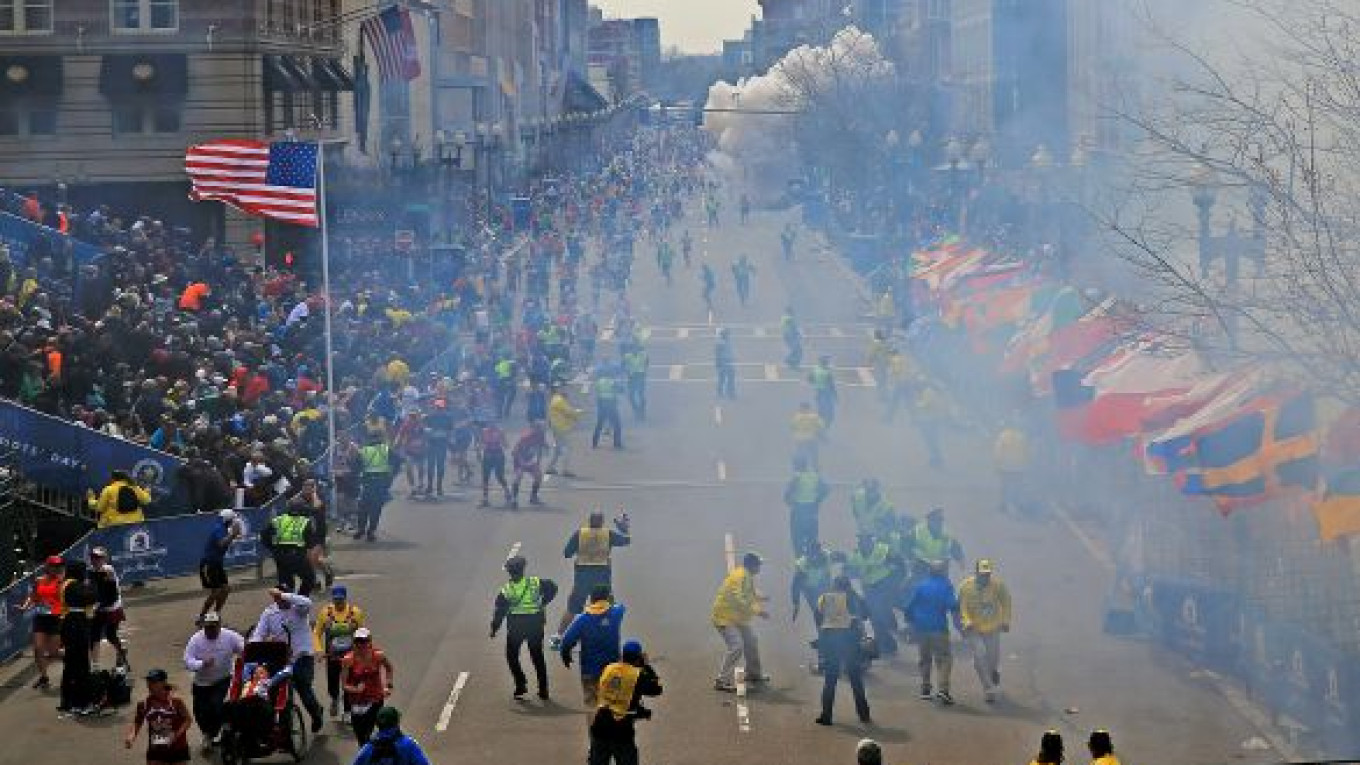A day after deadly explosions rocked the Boston Marathon in the United States, Russia's sports minister said the country will tighten security ahead of the 2014 Sochi Olympics and major sporting events this summer in Moscow and Kazan, cities that have both experienced terrorist attacks in recent years.
""Russia's security plan is very serious. Everything has been planned in advance for the Olympic Games, the Universiade and the World Championships in Athletics," Sports Minister Vitaly Mutko said Tuesday at the opening of a media conference in Sochi.
"Despite the fact that we have paid a lot of attention to these issues, we will discuss them again to avoid such situations," Mutko said.
A security expert, however, expressed skepticism at the effectiveness of measures promised by authorities, such as security cameras, saying the main tool for fighting terrorism should be sound intelligence.
A wide array of Russian officials on Tuesday expressed their determination to ensure tight security in the wake of the unexplained explosions Monday at the finish line of the Boston Marathon that claimed the lives of three people and injured more than 140 others.
The government has emphasized that security will be extremely strict for the 2014 Winter Olympics in Sochi, which sits in close proximity to the North Caucasus republics where local law enforcement engages in almost daily gun battles with separatist Islamic rebels.
Late Tuesday, the Interior Ministry announced that in view of the Boston blasts, security in Sochi will be tightened starting June 1, more than eight months before the start of the games in February, Interfax reported. The ministry did not specify exactly what measures would be taken. It said 29 Olympic facilities were already being specially guarded.
Alexander Polinsky, a Moscow official who is responsible for organizing the 14th IAAF World Championships in Athletics, told Interfax that "security is our number one priority."
The track and field world championships, which will bring almost 2,000 athletes to the city Aug. 10 to18, has been largely overshadowed by the upcoming Sochi Games and will not draw nearly as many visitors. But thousands of spectators are still expected to attend the events at Luzhniki Stadium and along the embankments of the Moscow River next to the Kremlin walls.
"The World Championships in Athletics is not as large-scale as the Boston Marathon, but we will have to consider all possible options. Especially now, after the Boston events," Polinsky said.
The Moscow police have scheduled a news conference for Wednesday on public security measures, including those to be taken for the August championships.
In July, Kazan will host the 27th Summer Universiade, an event viewed as an opportunity to boost the Tatar capital's reputation and infrastructure, just as the Olympics has been for Sochi and last year's APEC summit was for Vladivostok.
The government has dished out $1.2 billion to host about 13,500 university athletes for the event who will compete in 27 different sports in dozens of venues, including the Kazan Arena stadium that was specially built for the Universiade.
On Tuesday, Tatarstan's sports agency issued a statement expressing condolences to the victims of the Boston bombings and stressing that security will be its top concern at the Universiade, which it expects will be attended by 100,000 visitors who will be guarded by 20,000 law enforcement officers.
The city is on particularly high alert given last July's terror attack aimed at Tatarstan's top Muslim leader, who miraculously survived three bomb blasts that destroyed his car just minutes after gunmen killed his former aide in a coordinated assault.
An Islamist militant claimed responsibility for the attack, and the republic's legislature responded by tightening controls of religions organizations amid rising fears that Islamic radicalism could be spreading from the volatile North Caucasus to the traditionally stable republic bordered by the Volga River.
First deputy chairman of the State Duma's powerful Anti-Corruption and Security Committee Khozh Magomed Vakhayev said in a phone interview that the Boston events would not make a major impact on security enforcement in Russia, since the government is already implementing "an elaborate plan of security measures across major Russian cities."
According to Vakhayev, closed-circuit security cameras will form the core of these measures.
Commenting on the effectiveness of such cameras, Andrei Soldatov, a prominent authority on security services in Russia, said they could only help investigate an attack and were effective only as a prevention measure against petty crime.
"Many governments across the world have used terrorist acts as a pretext to shift responsibility for security from themselves to citizens. Now you have to take your shoes off, open your bag and declare if you notice anything suspicious," he said.
According to Soldatov, the only effective way to prevent terrorism is through security services' covert intelligence work, which most people rarely see the results of, given the highly secretive nature of Russia's security services.
Contact the author at i.nechepurenko@imedia.ru
Related articles:
A Message from The Moscow Times:
Dear readers,
We are facing unprecedented challenges. Russia's Prosecutor General's Office has designated The Moscow Times as an "undesirable" organization, criminalizing our work and putting our staff at risk of prosecution. This follows our earlier unjust labeling as a "foreign agent."
These actions are direct attempts to silence independent journalism in Russia. The authorities claim our work "discredits the decisions of the Russian leadership." We see things differently: we strive to provide accurate, unbiased reporting on Russia.
We, the journalists of The Moscow Times, refuse to be silenced. But to continue our work, we need your help.
Your support, no matter how small, makes a world of difference. If you can, please support us monthly starting from just $2. It's quick to set up, and every contribution makes a significant impact.
By supporting The Moscow Times, you're defending open, independent journalism in the face of repression. Thank you for standing with us.
Remind me later.


